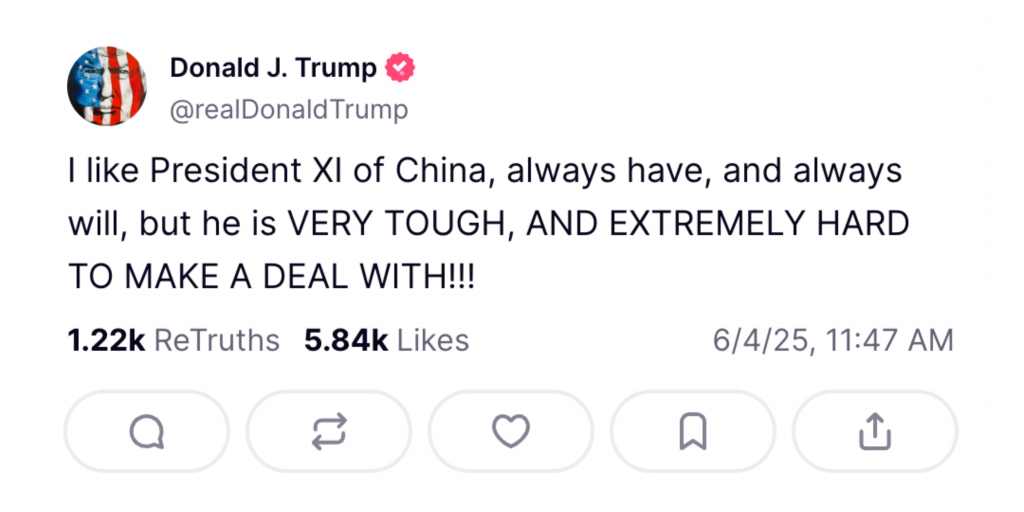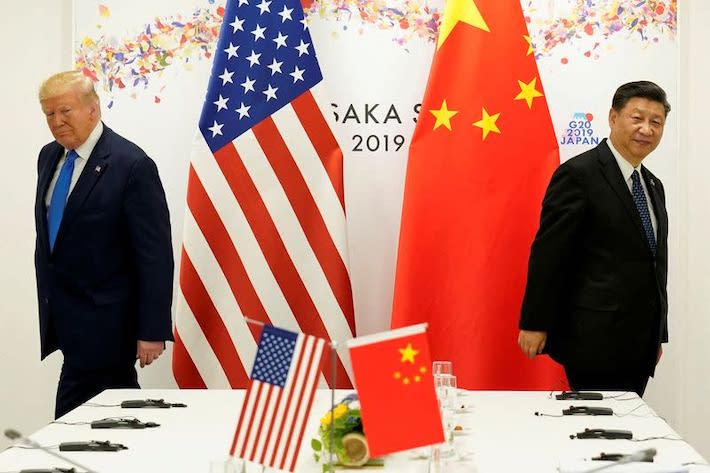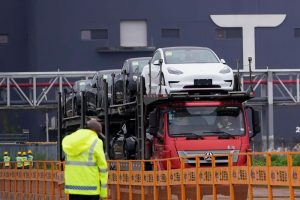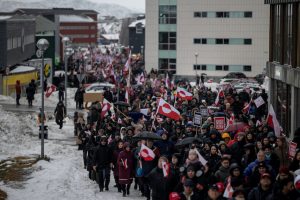The prospect of a trade deal between the US and China appears to be grim, as trust between Beijing and the Trump Administration has greatly deteriorated.
The 90-day trade war truce negotiated by officials from both sides in Geneva on May 12 looks to be hanging by a thread, amid reports that China reneged on its agreement to ease export controls imposed on critical minerals.
In a post on Truth Social on Wednesday President Donald Trump said his Chinese counterpart Xi Jinping is tough and “extremely hard to make a deal with.”
ALSO SEE: Carmakers Stressed by China’s Curbs on Critical Mineral Exports
That remark came just days after the US President accused China of violating an agreement to roll back tariffs and trade restrictions.
“I like President Xi of China, always have, and always will, but he is VERY TOUGH, AND EXTREMELY HARD TO MAKE A DEAL WITH,” Trump said.
On Monday, the Chinese Foreign Ministry gave its explanation on why the trade agreement reached in Geneva hit rocky water. Spokesman Lian Jian said the US made three violations of the agreement to slash tariffs – “controls on chip exports to China, halting the sales of chip design software to China, and announcing revocations of Chinese student visas.”
He accused Washington of taking “extreme measures” based on “defamatory accusations,” saying the US had “severely violated the common understandings reached in Geneva.”
However, it is unlikely that these issues – which occurred in the last week or two amid concern in the White House that China had failed to drop export controls on critical minerals as promised – were even discussed in Geneva.
US Trade Representative Jamieson Greer said on Friday that China had failed to remove non-tariff barriers as stipulated in the agreement, and criticized Beijing for restricting exports of rare earth magnets to the US and placing American companies on blacklists.
Greer noted Beijing’s slow compliance, but both sides could be faulted perhaps, given the US may be seen as having broken the ‘spirit of goodwill’ that brought bilateral tariffs down from three figures to far more sensible levels.

‘Poor track record on keeping agreements’
However, the apparent breakdown of the US-China trade deal is hardly surprising to officials and citizens in Southeast Asia.
This was well summed up by Lingling Wei, who covers China for The Wall Street Journal. In a mailout on Monday she noted that there is not a great deal of trust in the region on what Chinese officials say.
She said the Philippines Defence Secretary Gilberto Teodoro gave a blunt assessment at the Shangri-La Dialogue security conference in Singapore over the weekend: “China has a deficit of trust and credibility,” he reportedly said.
“It cuts right to the heart of what many believe is a big factor in tensions in the region — as well as between China and the US as trade talks now appear stalled,” she wrote.
“What Teodoro was referring to was a common friction point with trading partners: Beijing’s track record of not following through on its commitments.”
China ‘reneged on key concession’
Wei said: “During the Geneva talks … Xi Jinping’s chief trade negotiator, Vice Premier He Lifeng, agreed to a key demand from the US side that China renew allowing exports of rare-earth minerals needed to make chips, cars and other products. It was an 11th-hour concession from He that ultimately sealed the deal.
“But for Beijing, turning off such export restrictions didn’t mean they wouldn’t be turned on again. Having loosened the grip for just a few days after Geneva, China quickly slowed the approval process to a trickle.
“People familiar with the matter told us that’s because Beijing was upset over a US warning against the use of certain artificial-intelligence chips made by Huawei, one of the crown jewels of China Inc. Trump officials’ explanation to He’s team — that the Huawei warning wasn’t a new policy — failed to sway Beijing.
“Then, in response, the Trump administration suspended the sale of jet engines and some chip software to China. Tensions between the two world powers are escalating.
“With a trade team that is intent on not catering to the US, Beijing believes it is within its rights to take countermeasures such as renewed rare-earth controls. However, to its US counterpart, a promise is a promise, and it shouldn’t have been broken.”
Meanwhile, officials from ASEAN, the regional grouping for 10 Southeast Asian nations, have been discussing a code of conduct for the South China Sea with Beijing for nearly 30 years – a process that has led some analysts to say it’s like being taken on a very long walk to nowhere.
Perhaps the same could be said about another US trade agreement with China.
- Jim Pollard
ALSO SEE:
China Denies Trump Claim, Says It Was US That Broke Trade Deal
China ‘Totally Violated’ Tariffs Agreement With US, Trump Says
Trump’s Tariffs Reinstated as Appeals Court Pauses Trade Ruling
Shipments of US Ethane to China Face Export Licence Uncertainty
US Blocks Chip Design Software, Chemical Shipments to China
Beijing Says Latest US Chip Warning Puts Trade Truce at Risk
Mass Layoffs Avoided in China, But Export Sector Badly Shaken
Asian Markets Rise After US, China Agree to Cut Majority of Tariffs
China Follows US Playbook in Rare Earth Crackdown; Tesla Hit
China Halts Rare Earth Exports, Warns US on Deep-Sea Metals ‘Plan’
























